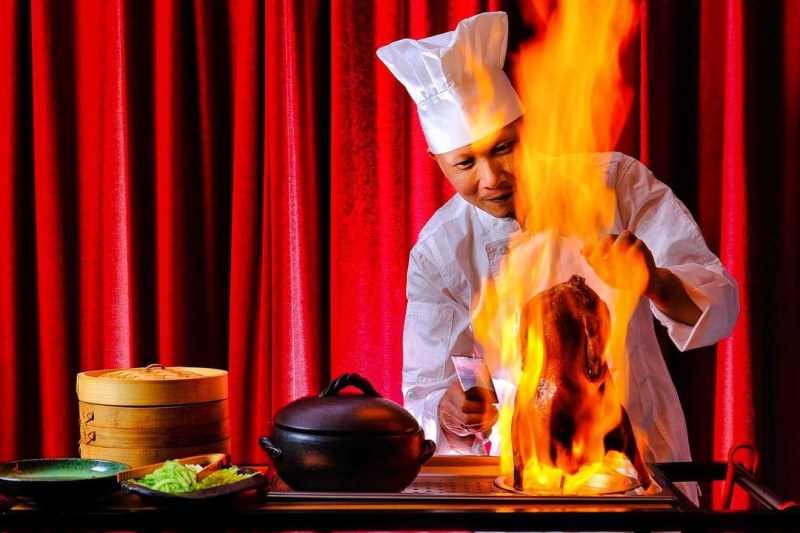
A whole Peking duck, perfectly roasted and bronzed, is one of the most prized culinary dishes in Chinese cuisine. Like China itself, the dish is ancient. It’s been mentioned as far back as the 14th century, and Henry Kissinger famously enjoyed it on several State Department visits to China during the 1960s and 1970s.
Traditionally, it’s served one way — carved table-side into slices and eaten with thin pancakes, julienned leeks, and sweet bean sauce. At Golden Wuish, a modern and elevated Chinese restaurant in New York, restauranteur Kevin Zhen and Chef Jesper serve Peking duck three ways: flambéed with Chinese baijiu wine, smoked table-side with lychee wood, and in a rich soup.
“Peking duck is one of the national dishes in China, and probably also the most famous Chinese dish within the U.S.,” said Chef Jesper. “We opened the restaurant hoping to promote Chinese culture via authentic Chinese food. So we put Peking Duck on the menu. Also, Kevin and I haven’t found a good, solid Peking duck in New York City. We really hope to have guests experience a delicious Peking duck.”

Preparing Peking duck
Preparing a Peking duck is a laborious multi-day process. Besides efforts made to enhance the flavor and tenderness of the meat, much effort is made to ensure the crispest skin possible. A drying period allows the skin to become wonderfully crisp, and the bronze sheen of the bird is due to a glaze of maltose and vinegar. Because of this complicated process, Peking duck is a restaurant dish in Chinese cuisine, not something prepared in home kitchens. It’s a dish reserved for special occasions and celebrations.
At Golden Wuish, Chef Jesper starts by sourcing their ducks from Long Island, New York. Because Peking Duck is such a specialized dish, he’s very particular about the size of his birds. “First, we always choose the duck that weighs around 5 pounds,” Chef Jesper said. “It is the best size. The skin is not too fatty, and the meat is not too lean. That’s why we can only serve 25 Peking ducks per day.”
To begin the process, Chef Jesper starts by cleaning the ducks thoroughly. Then, he marinades the ducks in a mixture of galangal, star anise, five spices, orange peels, Chinese cinnamon, and other spices. The spices are also placed within the duck’s stomach and massaged to ensure all the flavors are absorbed. The duck is then sewed shut with a needle and thread. Air is blown into the stomach, separating the skin for crispness. After this process, the duck is bathed in a solution of boiled water, vinegar, lemon, and maltose and hung for a 24-hour air-drying process. Finally, to cook, the duck is roasted for 40 minutes before being presented whole to the diner.

From flaming to smoking, modern innovation at Golden Wuish
Editors' Recommendations
- Here’s how to crawfish boil the right way (and everything else there is to know about crawfish)
- The Godfather cocktail is an underrated gem (and you only need 2 ingredients)
- It’s International Whiskey Day, and you need to try these whiskeys from around the world
- You may not dislike IPAs as much as you think — you’ve just tried the wrong type
- What foods are high in iron? These staples will help you live a healthier life



